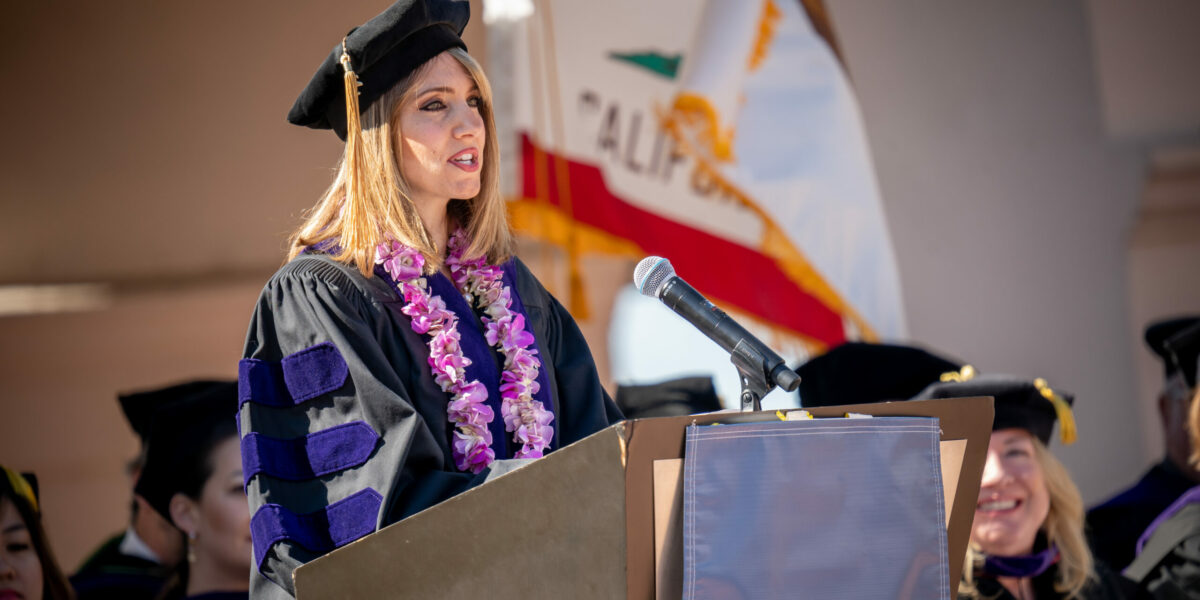The following is the complete text of graduating student Heather Stern’s address at The Colleges of Law 2023 commencement ceremony.
At a recent law school residency, my 11-year-old daughter had the opportunity to meet one of my classmates who playfully told her, “Your mother’s a talker. She doesn’t let the professors speak!” I guess it’s fair to say I wasn’t shy in class. Fortunately, the ability to make bold assertions in law school is recognized as a valiant effort to analyze and question the law. In legal writing, we learned it’s not how much you say; it’s what you say that counts, and our wise remedies professor taught us, “Every word matters. That’s how you win a lawsuit.” I have found my calling.
It’s said it takes a village to raise a child. I say it takes a village to get through law school, especially when you enter this journey later in life with an established career or a full-time job, children, a spouse, or being a single parent: tons of responsibility. None of us would be standing up here without all of you sitting down there, and for that, we thank you.
We have all entered law for different reasons. This is a collective story about how my peers, professors, and I arrived in law school.
One of our most beloved professors did so in the most like lawyerly way: by process of elimination. She was greatly impacted by Martin Luther King Jr.’s “I Have a Dream” and was inspired to change the world for the better, working in public interest. After studying at Yale, she considered graduate school, medical school or getting a Ph.D., but it was working on Wall Street, at a major New York law firm where she decided to become a lawyer, then our professor. She brought her Ivy League pedigree to The Colleges of Law and drilled legal rules into our brains until we could recite them in our sleep.

Two of my study mates entered law school to be the voice of others. They saw issues in our country and local communities they didn’t agree with and wanted to affect change.
One of them read an ad: “If you don’t like the way something is being done, get up and do something about it. Go to law school.” A mother of four, she doubted she could afford to go, but her boss wisely nudged her, “You cannot afford not to follow your dream.”
My other study partner, a former schoolteacher, witnessed the painstaking confusion and vulnerability of parents with students who had special needs. Some children lost services they not only had a right to but desperately needed and were denied access to education. As a future attorney, she plans to give kids an equal opportunity to succeed.
Many standing before you found their way to law because either they or their loved ones suffered unconscionable, inconceivable injustices.
One student who could no longer afford to for pay legal services lost custody of her child because she couldn’t combat false allegations, and just like that ad, she went to law school and committed her future to doing something about it.
I am that student.
Growing up privileged, I was oblivious to the “justice gap” and demographically insulated from injustice altogether. But after seven years in a long, drawn-out custody battle, I got a first-hand education. Inspired by the words of Justice Ginsberg — “If you’re going to change things, you have to be with the people who hold the levers” — I enrolled at Colleges of Law.
Through my studies, reading voluminous cases, I realize my story is just one of countless injustices that take place in our country every day. I personally represent 71% of our population needing legal assistance but unable to retain or sustain access. As an attorney, I plan to fight for fair judicial outcomes, so the dream of “justice for all” can be available to all, not just the few that can afford it.
Colleges of Law taught me no case is black or white, and the marriage of law and facts provides more than one outcome. In our first semester, a professor said law and logic sit in different rooms. This was a hard reality to swallow, but, fortunately, Colleges of Law has a strong faculty—beacons of light, really—who have been willing to engage with us on a personal and professional level, to share their experience and hope of how we will use the intricate tools of law to do good.
One of our deans, who decided she wanted to go to law school when she was only 12 years old, was drawn to represent the truth and has made it her goal to shape us into the “reasonable person” she was in law. She firmly reminds us that a carefully crafted argument and well-planned strategy can get you the same result without having to compromise being good lawyers and good, reasonable people.
Colleges of Law is a diverse student body reflective of its roots. Founded in 1969, during a time of profound social change in our country, its founders looked to elevate society. It was their dream to provide affordable legal education to people from all walks of life, their mission and vision to pioneer and modernize legal education by emphasizing opportunity, academic excellence, and committed community engagement. All pillars that have not been lost on this wonderfully eclectic and motivated graduating class of former pharmacist, forensic psychiatrist, teachers, bankers, police officers, technology experts, and artists. We are committed to Colleges of Law’s values and will go forth to skillfully practice law.
My name is Heather Stern. I am one of five students, all remarkable women, who made it through an accelerated, 32-month, hybrid Juris Doctorate program*. Against some very sound advice to take law school slow, this group of ladies and I committed to a rigorous speed of legal studies, and we persevered. I am proud to be among them and all of the 2023 Colleges of Law graduates.
Congratulations, class. We did it!
*The 32-month accelerated hybrid J.D. program mentioned is no longer available. However, the 40-month program is still available.

